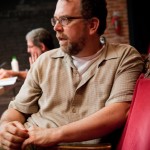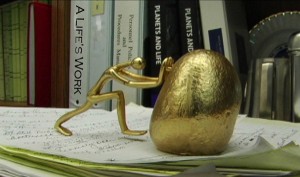
Fellow Extra Criticum contributor John Yearley heeded my call for guest bloggers, and I couldn’t be happier. Though to be honest, whenever I read anything John has written, I throw my fists in the air and curse the god of words. “Dammit,” I say, “why didn’t you give me the gift that you gave Yearley!?!”
John Yearley is the author of Leap, winner of the Mickey Kaplan New American Play Prize (Cincinnati Playhouse in the Park, Abingdon Theatre), and Ephemera, winner of the John Gassner Award (Summer Play Festival, LABryinth Intensive). His plays A Low-Lying Fog and All in Little Pieces are published by Samuel French. He has worked as a “script doctor” for New Line Cinema, and developed the animated series Mamu & Dinga. His new play, Another Girl, was read by the Naked Angels company in New York and selected for the PlayPenn conference in 2011. John is the author of the forthcoming book Daddy’s Not Tall Enough to Touch the Moon, a member of the Writers Guild of America, the Dramatists Guild, and a MacDowell Fellow.
Recently I caught a few minutes of a nature documentary on TV. I’m not sure what the whole thing was about, but what I remember was the fish. Lying in a rapidly evaporating stream, it was just barely covered in water. The day was blazingly hot. It flopped around madly, but there was nothing to be done. It had only minutes to live.
I was riveted by this spectacle, horrified actually (I’ve dreamt of it several times). Thinking of it later, I wondered why this image so burned itself into my mind. Then it occurred to me – that fish is me. And not only me. That fish is EVERYONE.
We are all mortal. The water around us is, inevitably, evaporating. The only difference is how much time we have left.
A radio play of mine, entitled Like Christmas Morning, includes the following exchange. The subject is peppermint ice cream:
DUANE: It is so good! Why don’t more people make it?
CARLOS: I don’t know. Why does anybody do anything?
Why does anybody do anything? Well, there are a lot of reasons. The reasons for doing things that give immediate gratification are pretty obvious. I eat something, I have sex with someone, I feel good (hopefully). That part is easy. But why do people do difficult things?
The main reason is that they think they can succeed. One of the great narratives of our culture is the story of the person who undertakes a difficult task, perseveres against all obstacles (“they said I was crazy!”), uses their intelligence and hard work and just plain stubbornness to triumph over all adversity. If you turn on a TV right now and scan channels, I guarantee you that you will find some version of this story playing right now.
When you succeed, the narrative line is clear (“I did it!”). But what if you don’t? Are all your smarts and hard work and diligence only valuable in so far as the desired result is achieved? Pushing the question even further – If we are, as I have stated, all fish flopping around in our rapidly diminishing pool of water, how does any of this so-called “success” even matter?
These are questions I grapple with a lot. You know who doesn’t? The people featured in David Licata’s documentary-in-progress A Life’s Work. Why is that? Because they know they’re going to fail. The subject of the film is people who are engaged in work that cannot or will not be completed in their lifetimes.
So these people are, according to our triumph-over-adversity narrative, failures. Their work is bound to fail, at least as long as their water lasts. So why does watching these “failures” go about their self-appointed tasks – building their buildings, preserving their music, planting their trees, searching for life beyond the stars –why does it make me so happy?
 Part of the reason is the tremendous skill with which David tells their stories. The participants are filmed with care and love. They are given the space they need to talk about their work and what it means to them. What is so richly satisfying about the film, however, comes from something else. There is an almost ineffable sense of wonder in A Life’s Work. Wonder at these people who have thrown off the yoke of the conventional definition of success to just do their work. To believe that their work has value to the world no matter what. They are happy Sisyphus’ all.
Part of the reason is the tremendous skill with which David tells their stories. The participants are filmed with care and love. They are given the space they need to talk about their work and what it means to them. What is so richly satisfying about the film, however, comes from something else. There is an almost ineffable sense of wonder in A Life’s Work. Wonder at these people who have thrown off the yoke of the conventional definition of success to just do their work. To believe that their work has value to the world no matter what. They are happy Sisyphus’ all.
That’s actually not true. Sisyphus’ story is a tragedy in that he accomplishes nothing. These people accomplish wonderful things. They just don’t finish. They work to work. Because they think it matters. Because it is important to them.
It is that particular aspect of this film, the serenity that comes with work done for work’s sake, that is particularly resonant to me. I am a fish, too. I flail as much as anyone. The things I long for (money, success, esteem) are ephemeral. I know that, but that knowledge doesn’t seem to stop me from flailing.
When I watch clips from A Life’s Work, however, when I am in the presence of its subjects, I am serene. I am able to hear the voice in my own head that I hear when I am at my happiest. It is a voice that says, “Just do your work. Live your life as best you can. Everything else is out of your control.”
Anything that can get that voice to speak up does me a great service. Here’s to hoping that A Life’s Work does that same service for many, many others.
Thank you, John.
